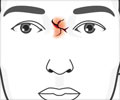India has laid claim to the world's first nose job, which according to scriptures, was conducted by Sushruta.
India has laid claim to the world's first nose job, which according to scriptures, was conducted by Sushruta.
Sushruta lived around 600 BC and is cited to have performed "sophisticated reconstructive surgery".Generations of Indians have believed that Westerners such as Aristotle drove scientific advances, largely because the Indian education system was framed by Britain, according to N.R. Iyer, the director of Delhi's National Science Centre.
"There is the widespread perception that science began in Greece. We want to correct this, and publicize advances made in India as long as 5,000 years ago," he told the Times.
A new exhibition at the centre suggests that the study of atomic theory, mathematics, biology and cosmic evolution were all born in the subcontinent - when Britons were living in huts made of wattle and daub.
The exhibition, the largest of its kind in the country, is intended to foster a sense of "scientific nationalism" among the burgeoning middle classes.
Highlights include the work of Sushruta, who lived around 600BC and performed "sophisticated reconstructive surgery" - probably on convicts who had their noses cut off as punishment.
Advertisement
The Delhi exhibition shows advances in smelting from AD 800, breakthroughs in astronomy between AD 400 and AD 1000 and multiple cropping used by farmers in 2500 BC.
Advertisement
He wrote, "The portion of the nose to be covered should be measured with a leaf. Then, skin of the required size should be dissected from the living skin of the cheek, and turned back to cover the nose, keeping a small pedicle attached to the cheek."
"The physician should then stitch the two parts swiftly, keeping the skin elevated by inserting two tubes of eranda (the castor-oil plant) in the position of the nostrils," he had added.
Sushruta also prescribed a rudimentary form of pain relief for the procedure.
"Wine should be used before operation to produce insensibility," he said.
The centre has been directed by the Indian Government to form a committee of experts to write papers laying claim to areas of science that arguably have their roots in India.
Top of the list is likely to be mathematics and the decimal system, and specifically the concept "zero" - a word derived from the Sanskrit shunya.
Source-ANI
ARU








